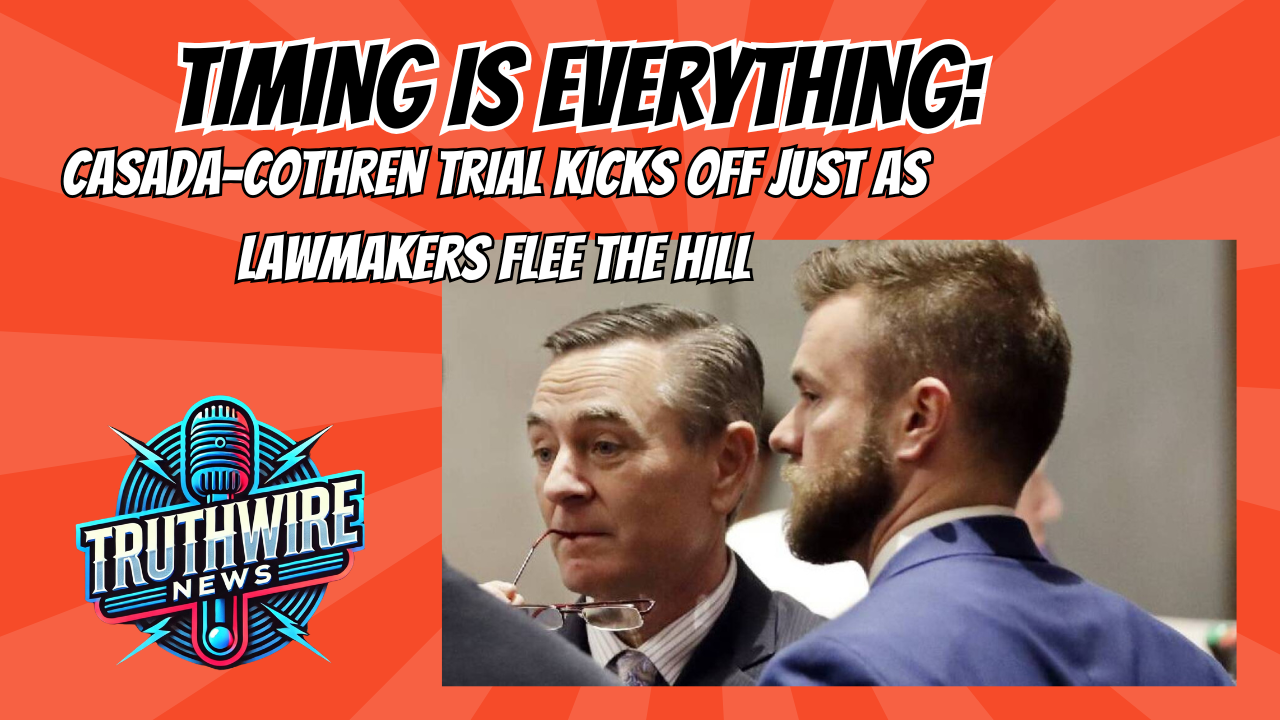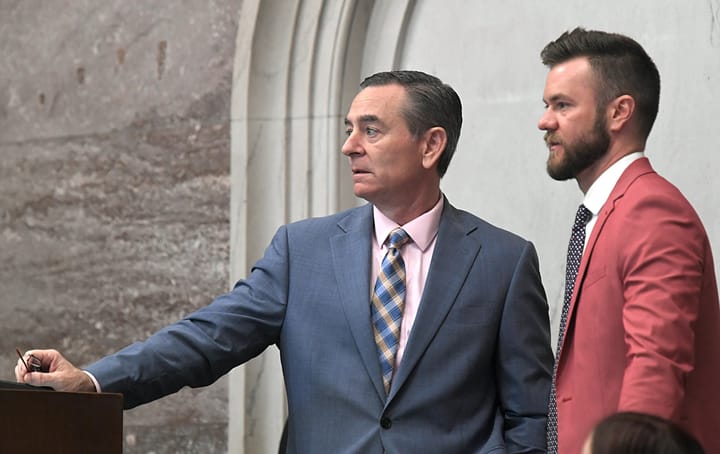The trial of former TN House Speaker Glen Casada and ex-chief of staff Cade Cothren begins April 22. Defense alleges federal prosecutors withheld key evidence and that Speaker Sexton and others under investigation may be biased witnesses.
By TruthWire News | April 2025
The long-awaited federal trial of former Tennessee House Speaker Glen Casada and his ex-chief of staff Cade Cothren is set to begin this week, in the Middle District of Tennessee. The two face a 20-count indictment involving conspiracy, bribery, wire fraud, money laundering, and falsification of records tied to a fraudulent political mailer company known as Phoenix Solutions.
But as opening arguments approach, the legal battle is no longer just about the alleged scheme. Serious questions have been raised about the credibility of key government witnesses—and whether federal prosecutors have withheld potentially exculpatory or impeaching evidence.
Allegations of Withheld Evidence and Witness Credibility
In a joint filing dated March 28, defense attorneys for Casada and Cothren asked the court to compel the U.S. Attorney’s Office to disclose Brady and Giglio material—evidence that could impeach government witnesses or aid the defense. They argue the government is in possession of such materials, particularly concerning House Speaker Cameron Sexton and former Office of Legislative Administration (OLA) Director Connie Ridley.
The defense contends that the government acknowledged an ongoing investigation into at least one of these witnesses six months ago, yet has failed to produce additional disclosures since. Instead, prosecutors asked the court to review the materials in secret via an ex parte motion, while providing only a heavily redacted version to the defense.
Defense counsel argues this violates due process, likening the situation to a "safe-cracking" scenario: "This is like the Government telling Defendants that they can only have what is inside a Government safe if Defendants can tell the Government how to open it and what is inside, despite the Government purchasing and possessing the safe, putting things inside it, and setting its lock combination."
Of particular concern are allegations that Speaker Sexton may have received per diem payments to which he was not entitled—allegations that, if substantiated, would relate directly to the same statutes under which Casada and Cothren are charged. The defense argues this could not only undermine Sexton's credibility but also show potential bias or motive if he is aware of an ongoing investigation.
Despite repeated requests, the government has neither confirmed nor denied the existence of such an investigation, instead claiming that if the evidence exists, it is either unsubstantial or does not meet disclosure thresholds. Defense attorneys say that’s not enough, and are asking the Court to order full disclosure—or bar Sexton and Ridley from testifying.
Motions in Limine: What Will the Jury Hear?
In a recent ruling dated April 18, U.S. District Judge Eli Richardson issued a detailed order addressing the government’s motions in limine—requests to limit what evidence or arguments may be presented at trial. Most of these motions were denied as premature, allowing the defense to raise issues at trial.
Key highlights of the judge’s order:
- The government failed to preemptively block the defense from arguing that Phoenix Solutions performed legitimate services, which prosecutors claim is irrelevant to the fraud charges.
- Statements by alleged co-conspirator Robin Smith may be conditionally admitted, subject to later validation that they meet federal rules for hearsay exceptions.
- The government’s attempt to preclude “bad character” arguments about other state officials (e.g., potential misconduct by Sexton or Ridley) was denied.
- The Court rejected the government’s effort to pre-block the defense from referencing Cothren’s cooperation with other federal investigations or using FBI agent reports to impeach witnesses.
However, the government withdrew one motion attempting to introduce evidence that Casada and Smith opposed an ethics bill—perhaps signaling concern that such context could work against the prosecution’s broader narrative.
Trial Overview: The Alleged Scheme
At the heart of the case is Phoenix Solutions, a mailer vendor set up by Cothren using a fake persona named “Matthew Phoenix.” Prosecutors allege that Casada and then-Rep. Robin Smith helped secure taxpayer-funded business for the company while concealing Cothren’s involvement. In return, the government claims, Casada and Smith received kickbacks from Phoenix’s profits, laundered through shell companies Right Way Consulting(Casada) and River’s Edge Alliance (Smith).
The indictment includes:
- Conspiracy charges
- Bribery and wire fraud
- Money laundering
- Use of a fictitious name
Robin Smith has already pleaded guilty, but the credibility of her cooperation is now also under scrutiny following recent motions and disclosures.
What’s at Stake
Beyond potential prison time, this case threatens to expose deeper systemic issues in Tennessee politics. If the defense’s allegations about witness misconduct or selective prosecution bear out, the trial could ripple far beyond two men in a courtroom—it could shake the very credibility of the government’s case and its witnesses.
With the trial having opened today, all eyes will be on Judge Richardson’s courtroom. Will the jury hear the full story—or a version filtered through redactions and withheld files?
TruthWire News will continue providing in-depth coverage throughout the proceedings.
If you support what I do, please consider donating a gift in order to sustain free, independent, and TRULY CONSERVATIVE media that is focused on Middle Tennessee and BEYOND!




Comments ()